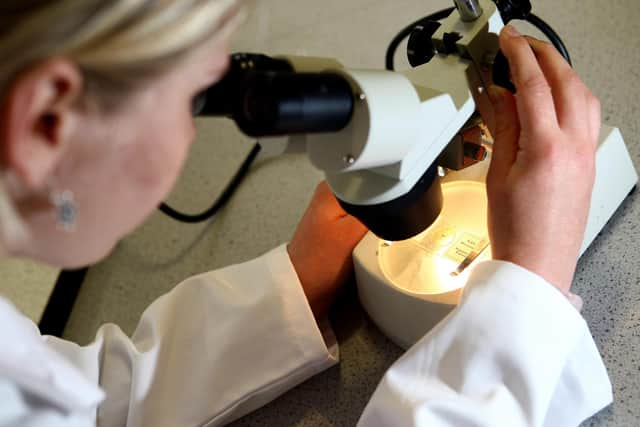Cervical Screening Awareness Week: uptake falls across Doncaster
and live on Freeview channel 276
But figures show women across England are still regularly skipping the straightforward procedures, with fear, embarrassment, or a lack of understanding of what they involve among the reasons why, according to Jo's Cervical Cancer Trust.
Currently in full swing, the charity's annual Cervical Screening Awareness Week aims to highlight the importance of regular screenings and help those with concerns about getting the tests.
Advertisement
Hide AdAdvertisement
Hide AdScreenings, also known as "smear tests", are offered to women and people with a cervix aged 25 to 49 every three years, while those aged 50 to 64 receive their invitations every five years. A small sample of cells is taken and checked for pre-cancerous abnormalities.


Just 72 per cent of the 81,208 patients in Doncaster eligible for a smear test by the end of 2021 attended a screening and had a clear result, according to NHS Digital data.
This was in line with the end of 2020, but a decrease from 75 per cent in December 2019.
Rates varied between the age groups last year – 74 per cent% of eligible 50 to 64-year-olds had been screened as of the end of December, compared to 70 per cent of 25 to 49-year-olds.
Advertisement
Hide AdAdvertisement
Hide AdAcross England, 70 per cent of eligible women had an adequate screening by the end of 2021, against a national target of 80 per cent. In 2019, the figure stood at 72 per cent.
Samantha Dixon, chief executive of Jo's Trust, said: “There is no one reason behind falling cervical screening attendance, instead a wide range of factors exist.
"These include NHS pressures, fear, embarrassment and not knowing what the test is for or thinking it is relevant.
"Cervical Screening Awareness Week is the ideal time to provide tips, reminders and signpost to support about the test, but work is needed all year round to tackle barriers and support more women and people with a cervix to attend this potentially life-saving test.”
Advertisement
Hide AdAdvertisement
Hide AdAround 2,700 women are diagnosed with cervical cancer in England each year and approximately 690 women die from the disease, according to NHS statistics which pre-date the pandemic – but Cancer Research UK estimates cervical screening saves at least 2,000 UK lives annually.
And a recent study suggests many cancers could still be prevented by women being screened every five years instead of every three.
Researchers at King’s College London said that screening women aged 24 to 49 who test negative for human papillomavirus (HPV) at five-year intervals curbed as many cancers as screening every three years.
The study of 1.3 million women in England found that women in this age group were less likely to develop clinically relevant cervical lesions, abnormal changes of the cells that line the cervix known as CIN3+, and cervical cancer three years after a negative HPV screen compared to a negative smear test.
Advertisement
Hide AdAdvertisement
Hide AdMichelle Mitchell, Cancer Research UK’s chief executive, said: “This builds on findings from years of research showing HPV testing is more accurate at predicting who is at risk of developing cervical cancer compared to the previous way of testing.
“As changes to the screening programmes are made, they will be monitored to help ensure that cervical screening is as effective as possible for all who take part.”
In these confusing and worrying times, local journalism is more vital than ever. Thanks to everyone who helps us ask the questions that matter by taking out a subscription or buying a paper. We stand together. Nancy Fielder, editor.
Comment Guidelines
National World encourages reader discussion on our stories. User feedback, insights and back-and-forth exchanges add a rich layer of context to reporting. Please review our Community Guidelines before commenting.
